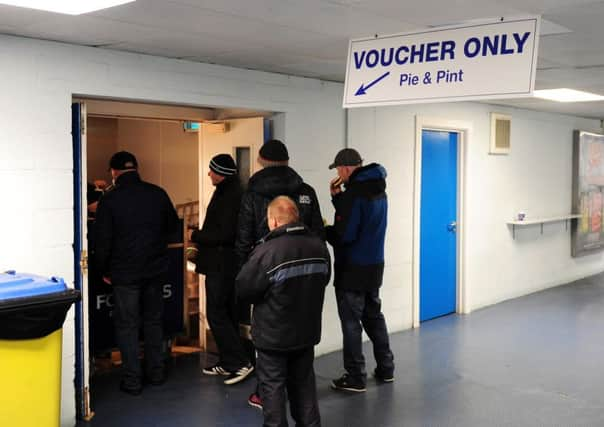Leeds pie tax comment: Should the league be protecting fans who earn an honest crust?


If you did not see it, Leeds decided to start charging fans sitting in the South Stand an additional £5 on the price of a ticket in exchange for a meal voucher (see picture). Supporters have to purchase the ticket with the voucher, whether they want it or not, meaning that it cost £32 to buy a match-day ticket for the Hull City game on Saturday.
To do the same for the Preston game on December 20 will cost £37, or £42 if a fan chooses to turn up on the day of the match and sit in the South Stand.
Advertisement
Hide AdAdvertisement
Hide AdOn the surface, it is little more than a bizarre story, a football club making life difficult for itself and its fans by making a questionable decision with their ticketing.
However, the reality is that it speaks for so much more of what goes on in the game.
Not least, there is the manner in which the Football League, who should be safeguarding the game and the fans, have done little to intervene.
To clarify, the Football League actually have no responsibility for this issue and the ‘pie-tax’ does not contravene their rules.
Advertisement
Hide AdAdvertisement
Hide AdTheir rules, it must be said, are confusing to the extent that anyone spoken to in research for the article, including clubs, believed that Leeds had the potential to be hit with a punishment for changing prices charged to home fans after the start of the campaign. Only the fact that it was part of a deal and not simply for the ticket was thought to be the saving grace.
After all, it would stop a club from suddenly increasing the prices if they went on an unexpected promotion charge. That would be horrific, wouldn’t it, to find yourself priced out of attending games in the latter stages of a season having followed a club over the campaign?
Well, that could be a reality. Clubs are not allowed to change what they charge away fans, but the same protection is not afforded to home fans at all.
Admittedly, home fans can benefit from four local promotions a season, where prices are dropped for them and not away fans. That is not to the liking of the Football Supporters’ Federation, who have previously spoken against the practice. It is clearly discriminatory against those travelling to the game, as the FSF have pointed out.
Advertisement
Hide AdAdvertisement
Hide AdIn fact, it could be argued that the Football League’s own chief executive, Shaun Harvey, is not a particularly big fan of local ticket promotions. During his nine years as chief executive officer at Leeds United, the Whites ran one-off promotions on match-day tickets three times, all in his final six months at the club.
The deal on those games against Blackpool, Derby County and Blackpool, dubbed ‘WatchLeeds4Less’, was spearheaded by Salem Patel of Gulf Finance House.
Throughout Harvey’s time as CEO at Leeds, there was little suggestion that high ticket prices were of much concern.
Leeds tended to have the most expensive season tickets in the division.
Advertisement
Hide AdAdvertisement
Hide AdKen Bates often spoke about the need to pay Premier League prices for Premier League football, despite the fact that Leeds spent his entire reign in the Championship and League One.
It is, therefore, no real shock that the Football League do not seem particularly keen to get involved with the ‘pie-tax’.
That is a shame. Fans are the lifeblood of the game and there is a developing feeling that this could be the last straw for many of them at Leeds. It will take time to see whether that is the case, but it is one of those occasions when morality should dictate what the Football League do above the strict word of law that they have implemented.
For the Football League, that is often the issue. There is no scope to apply subjectivity to their rules, and while that does, in theory, allow them to maintain a level of consistency, it also means that they often have to make decisions that are simply seen as a mistake by anyone watching on.
Advertisement
Hide AdAdvertisement
Hide AdEven now, with Massimo Cellino sat below the Sword of Damocles that is an impending suspension, people ask how he was allowed to take charge of Leeds in the first place. At the time, he had more court cases in his future than you can count on one hand, but because they did not have the judge’s ruling on his recent conviction in writing, the League could not stop him from buying the club.
It felt like a farce at the time, and has proven to be one.
While some will argue that it is not the place of the Football League to interfere in the running of limited companies, the ‘Golden Share’ means they have the power to do so. It is essentially a licensing system, one that can be withdrawn from a company at any time.
It is time for the Football League to take more action more regularly, and stop people from making a mockery of the game.
The Football League point out that clubs can only have their share withdrawn and suspended in the event of administration.